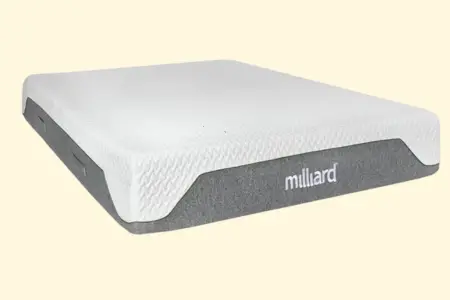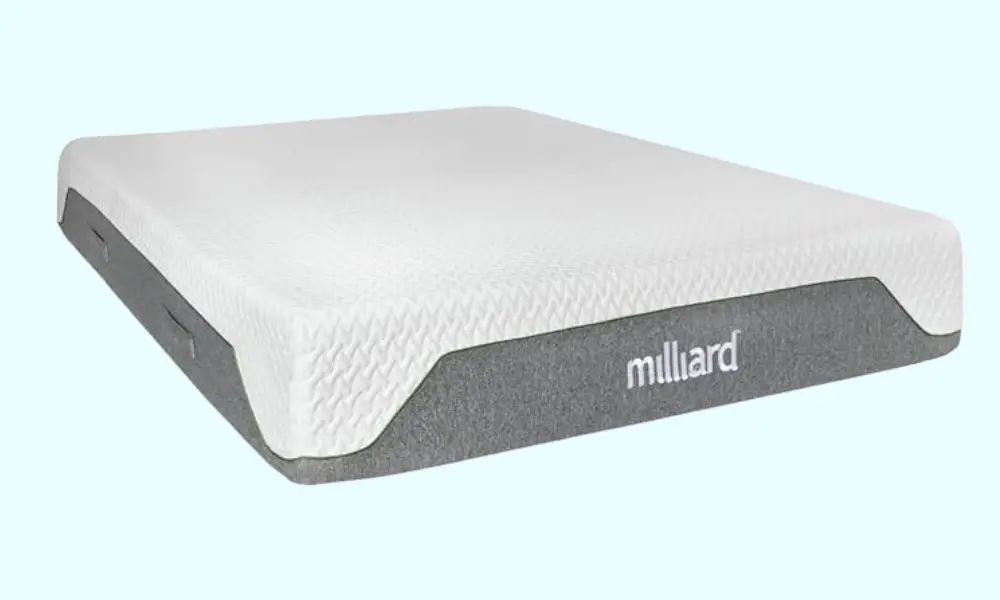A firmer mattress can help align your spine and reduce pressure on your joints. This support can lead to more restful sleep. Many people find that a firmer mattress helps them wake up with less pain.
Understanding The Connection Between Sleep And Joint Pain
Understanding how sleep affects joint pain is essential. Quality sleep supports overall joint health. Let’s explore this connection.
Why Quality Sleep Matters For Joint Health
Getting enough quality sleep is crucial for healthy joints. Sleep helps the body recover and repair. It also reduces inflammation. Poor sleep can worsen joint pain and stiffness.
Here are key reasons why quality sleep is important for joint health:
- Restoration: Sleep allows muscles and joints to recover.
- Reduced Inflammation: Proper sleep decreases inflammation in the body.
- Pain Management: Good sleep can lessen the perception of pain.
- Improved Mobility: Quality sleep leads to better movement and flexibility.
Studies show that people with good sleep patterns report less joint pain. Sleep helps maintain a healthy weight. This reduces stress on joints. A firmer mattress can provide better support. It can align the spine and reduce pressure points.
Here is a table showing how sleep quality impacts joint health:
| Sleep Quality | Joint Pain Level |
|---|---|
| High | Low |
| Moderate | Medium |
| Low | High |
Common Causes Of Joint Pain During Sleep
Several factors can cause joint pain during sleep. Understanding these causes can help find solutions. Many people struggle with discomfort at night. Here are common reasons:
- Arthritis: This is a leading cause of joint pain. Arthritis can flare up at night.
- Injury: Past injuries can cause pain while sleeping.
- Improper Mattress: A mattress that is too soft can lead to poor support.
- Sleep Position: Certain positions may increase pressure on joints.
People often experience joint pain in different sleeping positions:
- Sleeping on the side can put pressure on the hips and knees.
- Back sleeping may stress the lower back.
- Stomach sleeping can strain the neck and spine.
Adjusting sleep positions and using a firmer mattress can help. A firmer mattress provides better support. This can reduce pain and improve sleep quality.
Best Firm Mattress For Joint Pain

The Role Of Mattress Firmness In Joint Pain Relief
The firmness of a mattress plays a big role in joint pain relief. A firmer mattress provides better support. This support helps keep the spine and joints aligned.
How Mattress Support Affects Joint Alignment
Mattress support is crucial for joint alignment. A well-supported body maintains its natural curve. This alignment reduces strain on joints. Misalignment can lead to discomfort and pain. A firmer mattress keeps your body in the right position. It helps distribute weight evenly across the surface. Here are some benefits of good mattress support:
- Reduces pressure points on joints.
- Improves spinal alignment.
- Decreases tossing and turning.
- Enhances overall sleep quality.
A firmer mattress can help those with conditions like arthritis. It provides the needed support to alleviate discomfort. The right mattress can make a significant difference.
Consider this table to understand mattress support:
| Mattress Type | Support Level | Joint Impact |
|---|---|---|
| Soft Mattress | Low | May cause misalignment |
| Medium Mattress | Moderate | Balance of support |
| Firm Mattress | High | Promotes alignment |
Soft Vs. Firm Mattresses: What’s The Difference?
Soft and firm mattresses offer different levels of comfort and support. Soft mattresses can feel cozy. They conform to your body. This can be nice for some people. However, it may not provide enough support for joints. Over time, this lack of support can lead to pain.
Firm mattresses offer more resistance. They keep your body aligned. This is important for your spine and joints. Many people with joint pain prefer firmer options. Here are some key differences:
- Pressure Relief: Soft mattresses relieve pressure but may cause misalignment.
- Support: Firm mattresses provide better support for joint alignment.
- Durability: Firm mattresses tend to last longer than soft ones.
Choosing the right mattress firmness is essential. It impacts sleep quality and joint health. Test different mattresses to find the right fit. Your comfort matters. Prioritize your health and well-being when selecting a mattress.
Benefits Of A Firmer Mattress For Joint Pain
Understanding the benefits of a firmer mattress can help you make an informed choice for better sleep.
Improved Spinal Alignment
Spinal alignment is crucial for overall health. A firmer mattress promotes a neutral spine position. This means your spine stays in line while you sleep. Proper alignment can reduce pressure on joints and muscles.
Here are some key benefits of improved spinal alignment:
- Reduces back pain
- Minimizes discomfort in the neck and shoulders
- Helps maintain good posture
A study showed that people who sleep on firmer mattresses report less pain. They also experience better sleep quality. A firmer mattress supports the natural curves of your body. It prevents sinking, which can cause misalignment.
For those with joint pain, a firmer mattress can be a smart choice. It encourages better posture and supports your spine. This leads to less pain and more restful nights.
Even Weight Distribution For Pressure Relief
Even weight distribution is vital for comfort. A firmer mattress helps spread your body weight evenly. This reduces pressure on specific points, like hips and shoulders. Less pressure means less pain and discomfort.
Here are the benefits of even weight distribution:
- Decreases the risk of pressure sores
- Improves blood circulation
- Enhances overall sleep quality
Firmer mattresses often use materials that conform to your body. These materials provide support without excessive sinking. This helps to keep your spine aligned while relieving pressure points. Research shows that even weight distribution can lead to longer, more restful sleep.
Those with joint pain may find firmer mattresses more beneficial. They can help prevent tossing and turning during the night. A more comfortable sleep surface leads to better rest and recovery.

Enhanced Durability And Long-term Support
A firmer mattress often lasts longer than a softer one. Firmer materials are less likely to sag over time. This durability provides consistent support for your body. A mattress that maintains its shape helps prevent joint pain.
Consider these factors about durability:
- Less wear and tear over the years
- Better investment for your health
- Consistent comfort and support
Many firmer mattresses use high-quality materials. These materials resist body impressions and sagging. This means you get long-term support without needing frequent replacements. A durable mattress can make a significant difference in managing joint pain.
Investing in a firmer mattress is not just about comfort. It is about ensuring better health and sleep quality. This choice leads to fewer nights of discomfort and more restful sleep.
Is A Firmer Mattress Right For You?
Understanding your needs is essential. The right mattress can alleviate pressure on your joints and improve your sleep quality.
Factors To Consider: Sleeping Position And Body Type
Your sleeping position and body type play a key role in choosing the right mattress firmness. Here are some important points to consider:
- Back Sleepers: They often benefit from medium to firm mattresses. This support keeps the spine aligned.
- Side Sleepers: They may need softer mattresses. Softer surfaces cushion the shoulders and hips.
- Stomach Sleepers: A firmer mattress is usually best. It prevents the hips from sinking too deeply.
Body type also matters:
| Body Type | Recommended Mattress Firmness |
|---|---|
| Lightweight (under 130 lbs) | Soft to Medium |
| Average (130-230 lbs) | Medium to Firm |
| Heavyweight (over 230 lbs) | Firm |
Finding the right balance is crucial for joint pain relief. Test different mattresses to see what feels comfortable.
Signs Your Current Mattress May Be Too Soft
A mattress that is too soft can lead to poor sleep quality. Here are some signs to watch for:
- Back Pain: Waking up with pain may indicate a lack of support.
- Feeling Stiff: Stiffness in joints can signal that your mattress is not supportive enough.
- Sinkage: If your body sinks too deeply, it can misalign the spine.
Other signs include:
- Difficulty changing positions during sleep.
- Feeling overly warm due to poor airflow.
- Visible sagging or indentations in the mattress.
Regularly assess your mattress. If you notice these signs, it may be time to consider a firmer option.
When A Firmer Mattress May Not Be Ideal
A firmer mattress is not for everyone. Some situations may require caution. Consider these factors:
- Joint Conditions: Conditions like arthritis may need softer surfaces for comfort.
- Specific Injuries: Recent injuries may require softer support during recovery.
- Personal Preference: Some people simply prefer a softer feel.
Listen to your body. Test a firmer mattress and see how it feels. If discomfort arises, a softer mattress might be better.
Comfort is subjective. Everyone has different needs. Find what helps you sleep well and reduces joint pain.
Tips For Choosing The Right Mattress For Joint Pain Relief
This support can reduce pressure on your joints. Choosing the right mattress is key. Here are some tips to help you find the best mattress for joint pain relief.
Testing Firmness Levels Before You Buy
Firmness matters when choosing a mattress. Different people prefer different levels of firmness. Testing the firmness before buying is essential.
Here are some steps to test firmness:
- Lay on the mattress for at least 10-15 minutes.
- Try different sleeping positions: back, side, and stomach.
- Check if your spine stays aligned.
- Note if your shoulders and hips sink in too much.
Many brands offer different firmness levels. Here’s a simple table to help you understand:
| Firmness Level | Best For |
|---|---|
| Soft | Side sleepers |
| Medium | Combination sleepers |
| Firm | Back and stomach sleepers |
Choose a firmness level that suits your sleeping style. A firmer mattress often provides better support for joint pain.
Materials And Features To Look For
The materials in a mattress affect comfort and support. Look for high-quality materials that relieve pressure on joints. Here are some materials to consider:
- Memory Foam: Conforms to your body, offering excellent support.
- Latex: Provides bounce and support with natural materials.
- Hybrid: Combines foam and innerspring for a balanced feel.
Features also play an important role:
- Cooling technology: Helps regulate temperature for better sleep.
- Edge support: Prevents sagging and provides a stable surface.
- Pressure relief: Reduces stress on joints during sleep.
Choosing the right materials and features can enhance comfort. This choice is vital for joint pain relief.
The Importance Of A Sleep Trial And Warranty
A sleep trial allows you to test the mattress at home. This period is crucial for finding the right fit. Many brands offer sleep trials from 30 to 120 nights.
During the trial, consider these points:
- Test the mattress in your usual sleep position.
- Assess how your body feels after waking up.
- Check if your joint pain improves over time.
A warranty protects your investment. Look for a warranty of at least 10 years. This can cover defects and issues that may arise. A good warranty shows confidence in the product.
Overall, both a sleep trial and warranty provide peace of mind. They ensure you make a well-informed decision.



